Green tea has become a rage in the world of health and nutrition. Teeming with a number of healthy antioxidants and minerals, green tea could help you lose those extra kilos and even do wonders for your skin. However, according to a latest study consuming green tea along with dietary iron may reduce green tea's benefits. The study published in the 'American Journal of Pathology', was done on a mouse model of inflammatory bowel disease.
"If you drink green tea after an iron-rich meal, the main compound in the tea will bind to the iron," said Matam Vijay-Kumar, assistant professor of nutritional sciences, Penn State.
"When that occurs, the green tea loses its potential as an antioxidant. In order to get the benefits of green tea, it may be best to not consume it with iron-rich foods," adds Vijay-Kumar.
Iron is a vital nutrient that helps boost red blood cell production. Iron-rich foods include red meat and dark leafy greens such as kale and spinach. The researchers said that the same results apply to iron supplements.
Researchers found that EGCG -- the main compound in green tea -- potently inhibits myeloperoxidase, a pro-inflammatory enzyme released by white blood cells during inflammation.
Inactivation of myeloperoxidase by EGCG may be beneficial in mitigating IBD flare-ups. But when EGCG and iron are consumed simultaneously, iron-bound EGCG loses its ability to inhibit myeloperoxidase.
Adding to this complexity, they found that EGCG can also be inactivated by a host protein, which is highly abundant in inflammatory conditions. IBD is a common disease characterised by chronic inflammation of the digestive tract. It results in irregular bowel movement, bloody diarrhoea, pain, fatigue, weight loss and other symptoms including iron deficiency/anemia. IBD patients are commonly prescribed iron supplements.
According to researchers, the intake of green tea and iron supplements at the same time would be counterproductive as both nutrients would bind and cancel each other out.
"It is important that IBD patients who take both iron supplements and green tea know how one nutrient affects the other," Vijay-Kumar said.
"The information from the study could be helpful for both people who enjoy green tea and drink it for its general benefits, as well as people who use it specifically to treat illnesses and conditions," continued Vijay-Kumar.
"The benefit of green tea depends on the bioavailability of its active components. It is not only a matter of what we eat but also when we eat and what else we eat with it," said Beng San Yeoh, a graduate student in immunology and infectious diseases and first author of the study.
(This content including advice provides generic information only. It is in no way a substitute for qualified medical opinion. Always consult a specialist or your own doctor for more information. NDTV does not claim responsibility for this information.)







